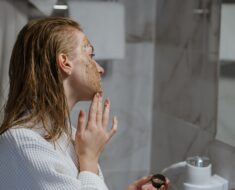Have you ever wondered if your morning coffee ritual could be leaving more than just a caffeine buzz? Here’s a thought-provoking question to kickstart your day:
Does coffee make your skin darker? This seemingly innocent beverage might have more impact on your complexion than meets the eye.
In a nutshell, the answer is a blend of myth and reality.
While coffee won’t magically turn you into a sun-kissed goddess, it does possess certain properties that could influence your skin.
We’ll navigate through the facts and fictions surrounding this topic, unveiling the secrets that brew beneath the surface.
Here if you want to know the disadvantage of coffee.
Does coffee make your skin darker?
No, drinking coffee does not make your skin darker. The color of your skin is primarily determined by the amount of melanin, a pigment produced by skin cells.

Coffee consumption has no direct impact on melanin production.
However, excessive exposure to the sun without proper protection can lead to increased melanin production, causing the skin to darken.
It’s crucial to note that factors like genetics, sun exposure, and skincare practices play more significant roles in determining skin tone.
While coffee contains antioxidants that may offer some skin benefits, it doesn’t influence melanin production in a way that affects skin pigmentation.
To maintain healthy skin, focus on a balanced diet, hydration, sun protection, and a consistent skincare routine.
Here, coffee ground for skin whitening?
Facts about coffee does not your skin darker
There is a common misconception that drinking coffee can darken your skin, but this notion lacks scientific basis.
Coffee consumption does not contribute to changes in skin pigmentation. The color of your skin is primarily determined by the amount of melanin, a pigment produced by melanocytes in the skin.
Here, coffee cream for skin?
Coffee contains antioxidants and other beneficial compounds that can have positive effects on overall health, but they do not alter skin color.
In fact, moderate coffee consumption has been associated with various health benefits, such as improved cognitive function, reduced risk of certain diseases, and increased antioxidant intake.
Skin color is influenced by genetic factors, exposure to sunlight, and hormonal changes.
Melanin production increases in response to sun exposure, leading to tanning, but this process is not influenced by coffee consumption.

It’s important to dispel myths surrounding the effects of certain foods and beverages on skin color and rely on scientific evidence.
Here, coffee for skin care.
Thus, to enjoy your coffee without worrying about it darkening your skin.
Embracing a healthy lifestyle, including a balanced diet, proper hydration, and sun protection, is key to maintaining good skin health.
Related faq’s
Does applying coffee make your skin darker?
No, applying coffee to your skin does not make it permanently darker.
While coffee may temporarily stain the skin, this effect is not long-lasting.
The natural compounds in coffee, like caffeine and antioxidants, can have mild anti-inflammatory and exfoliating properties, but they don’t permanently change skin color.
Is coffee good for skin whitening?
Coffee is not a reliable skin whitening agent. While it contains antioxidants that may promote skin health, it doesn’t have the ability to lighten skin permanently.
Skin color is primarily determined by genetics.
For effective and safe skin lightening, consult a dermatologist and use products specifically designed for that purpose.
Does coffee change your skin?
Coffee can have mild effects on the skin. Its antioxidants may offer some protection against free radicals, and caffeine may temporarily reduce inflammation.
However, coffee doesn’t fundamentally alter skin characteristics like color or texture.
Factors like genetics, overall skincare, and lifestyle habits play more significant roles in determining skin health and appearance.
Does coffee make you tanned?
No, coffee doesn’t make you tanned. While topical application of coffee may temporarily stain the skin, it doesn’t cause a lasting tan.
Skin color is primarily influenced by melanin production, which is determined by genetics and sun exposure.
Coffee’s effects on skin are cosmetic and not linked to melanin production.
Conclusion:
In conclusion, the impact of coffee on skin tone remains inconclusive.
While some studies suggest a potential link between coffee consumption and skin darkening due to antioxidants, more research is needed.
Moderation is key, as excessive caffeine intake can have adverse effects. Embrace a balanced lifestyle for radiant skin.






